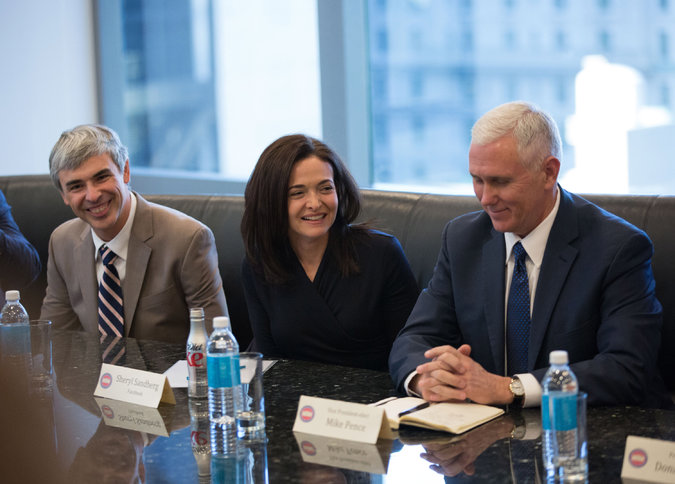Google, in Post-Obama Era, Aggressively Woos Republicans

WASHINGTON — Few companies have been as intimately tied to the Democratic Party in recent years as Google. So now that Donald J. Trump is president, the giant company, in Silicon Valley parlance, is having to pivot.
The shift was evident a day after Congress began its new session this month. That evening, about 70 lawmakers, a majority of them Republicans, were feted at the stately Smithsonian Arts and Industries Building, where they clinked champagne and bourbon glasses and posed for selfies with the 600 guests assembled in their honor.
The event’s main host was not from the Republican establishment. Instead, the party was primarily financed and anchored by Google.
“We’ve partnered with Google on events before, but nothing like this party,” said Alex Skatell, founder of The Independent Journal Review, a news start-up with a right-leaning millennial audience, which also helped host the event.
The event was emblematic of an about-face by Google. Over the last eight years, the company was closely associated with former President Barack Obama. Google employees overwhelmingly supported Mr. Obama’s presidential campaigns, and some later took roles in his administration. Eric Schmidt, the chairman of Alphabet, Google’s parent company, advised the Obama White House. And last year, Google employees gave $1.3 million to Hillary Clinton’s campaign to succeed Mr. Obama, compared with $26,000 to the Trump campaign, according to federal filings.
Now, the tech giant is scrambling to forge ties with Mr. Trump’s new administration and to strengthen its relationship with a Republican-dominated Congress. Most important, Google is trying to change the perception that it is a Democratic stronghold.
That has led to events like the party at the Smithsonian, which the institution said had cost at least $50,000. Mr. Schmidt has embarked on an East Coast charm offensive of Republican political leaders, including twice visiting Mr. Trump and his advisers at Trump Tower. Last month, Google also posted an opening to fill a position for a “conservative outreach” employee in its Washington office.
“Google has a target on its back because it is fundamentally viewed as a Democratic company,” said Gigi Sohn, a former senior adviser to Tom Wheeler, who was chairman of the Federal Communications Commission. “Even though it has reached out to Republicans, it can’t shake the image.”
Google said it had long had Republican lobbyists and had not changed its strategy.
“We’ve worked with both Republicans and Democrats for over a decade, advocating policies to encourage economic growth, innovation and entrepreneurialism,” the company said in a statement. “We’ll continue to do exactly that.”
A spokesman for Mr. Schmidt added, “Eric has a long record of working constructively and energetically on important technology issues with American and world leaders across the political spectrum.”

Eric Schmidt, the chairman of Alphabet, Google’s parent company, arriving at Trump Tower in January to meet with Donald J. Trump. Mr. Trump’s team is wary of Mr. Schmidt, who has been allied with Democrats and advised the Obama White House. Credit Kevin Hagen for The New York Times
Other Silicon Valley tech companies, like Facebook, are in a similar predicament. The perception is that they lean left and their executives backed Mrs. Clinton. Many are now also pledging to work with Mr. Trump and paid court to the new president at a December tech summit meeting.
One week into the administration, Google and other tech companies began to push back, criticizing Mr. Trump’s executive order on immigration bans. The company said an estimated 187 employees were affected by the order and it urged any of those employees who were abroad to work with the company to return safely to the United States.
”It’s painful to see the personal cost of this executive order on our colleagues,” Sundar Pichai, Google’s chief executive, said in a memo to employees over the weekend. “We’ve always made our views on immigration issues known publicly and will continue to do so.”
Google has much at stake as it repositions itself. During the Obama years, Google avoided American antitrust charges, even as European regulators accused the firm of antitrust violations in search and in its mobile business. Google also successfully pushed a policy agenda that included the creation of net neutrality rules in 2015 and the defeat of online piracy laws in 2012.
Now warning shots against Google have been fired by those in Mr. Trump’s circle. Some of the president’s advisers have debated whether the tech behemoth deserves more antitrust scrutiny, according to two people briefed by the new administration’s transition team, who spoke on the condition of anonymity.
In a recent interview with The New York Times, Peter Thiel, a venture capitalist and Trump transition adviser, also compared the power that Google had under Mr. Obama to that which the oil giant Exxon Mobil had under President George W. Bush. Under President Bush, the administration largely agreed with Exxon’s skeptical stance on climate change policy.
Mr. Trump’s team is particularly wary of one Google executive — Mr. Schmidt — who has been allied with Democrats. During last year’s presidential campaign, Mr. Schmidt counseled Mrs. Clinton on strategy. A photo of him wearing a staff badge at her election-night party circulated widely in the conservative media.
Mr. Trump’s advisers, including his chief strategist, Stephen K. Bannon, have complained about Mr. Schmidt’s funding of a start-up called the Groundwork, which provided data and other technology for Mrs. Clinton’s campaign. They also suspected Google was skewing search results in favor of Mrs. Clinton, said Barry Bennett, a former senior adviser for Mr. Trump’s campaign.
“Mr. Schmidt spent millions and millions of his personal money to defeat Donald Trump,” Mr. Bennett said. “It takes a particular amount of gumption to pretend that never happened.”
Google has denied it tweaked its search results, which are determined by algorithms, and the company declined to comment on Mr. Schmidt. White House officials did not respond to a request for comment.
For many years, Google’s support of Democrats was plain. Google’s political action committee and employees ranked third in all donations to Mr. Obama’s 2012 campaign at $804,240, according to the Center for Responsive Politics. In 2008, Google’s PAC and employees were sixth with $817,855. The company did not rank in the top 20 for donations to Mr. Obama’s Republican opponents in either of those elections.

About five years ago, Google began diversifying its bets. The company forged ties with the Republican-dominated House of Representatives and started addressing the beginning of an antitrust investigation into whether the company was using its search dominance to suppress competing travel, map and restaurant sites.
In 2011, Google hired Stewart Jeffries, a former member of the House Judiciary Committee, to lobby Republicans on Capitol Hill. That same year, it quadrupled its number of outside lobbying firms — including many with Republican lobbyists — to 24, from six in 2010. In 2012, Google named a former Republican congresswoman, Susan Molinari of New York, to lead its Washington office.
Google also sponsored conservative think tanks such as the American Enterprise Institute and the Heritage Foundation. The company has hosted Republican lawmakers including the House majority leader, Kevin McCarthy of California, and Darrell Issa of California at its headquarters in Mountain View, Calif.
Google’s Washington office is now roughly split between Republican and Democrats. The company spent $15.43 million in lobbying in 2016, according to federal lobbying documents, making it among the top dozen firms in lobbying spending last year. For the first time last year, Google’s PAC gave more to Republican congressional candidates than to Democrats, according to the Center for Responsive Politics.
Even so, Google’s Republican ties got little notice because of the company’s strong relationship with Democrats. Several Google employees joined the Obama administration while dozens of government bureaucrats were employed by the tech company. Google’s head of global public policy, Caroline Atkinson, was Mr. Obama’s former national security adviser. A former Google executive, Megan Smith, became the nation’s chief technology officer.
During his presidency, Mr. Obama also repeatedly supported proposals backed by Google, including net neutrality in 2015 and cable set-top box reforms last year.
“Google was very much treated as the golden child by the Obama administration,” said Jeffrey Chester, executive director of the Center for Digital Democracy, which has been critical of Google for privacy policies.
Since the election, Google has accelerated efforts to win over the Republican White House and Congress. Before his visits to Trump Tower, Mr. Schmidt met with Mr. McCarthy and Senator John Thune, a Republican from South Dakota, who is chairman of the Commerce, Science and Transportation Committee.
Days after Mr. Trump’s victory, Google also contacted The Independent Journal Review, which it had worked with on events during the Republican campaign debates. Google told the news start-up that it would provide the main funding for the party at the Smithsonian.
Google said the event was open to both parties. But pairing with the conservative site sent a clear message to attendees. “We definitely helped draw Republicans and people from across the spectrum,” said the site’s founder, Mr. Skatell.
At the party, several Republican lawmakers were positive about their tech host, brushing off questions about the company’s heft and power.
“When I think of technology and Google, I don’t think of dominance,” said Representative Bradley Byrne, a Republican from Alabama. “I think of innovation.”
(62)